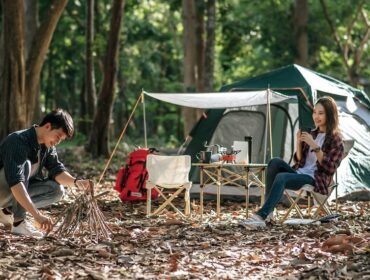Our daily lives can be overwhelming, filled with responsibilities at home and work that often leave us yearning for extra hours in the day. This constant hustle can create significant stress and anxiety, making it difficult to find moments of peace. Anxiety is one of the most common mental health challenges, affecting around 40 million adults in the US alone, and these numbers continue to grow each year. While there are many methods to combat stress, from lifestyle changes like regular exercise and meditation to decluttering your living space, one powerful yet often overlooked remedy is camping.
Camping is an incredible way to immerse yourself in the natural world. Being surrounded by trees, lakes, sunlight, and birdsong can help your mind relax and foster a sense of calm. Many of us are accustomed to urban environments filled with skyscrapers, noisy traffic, and visual clutter. Escaping to a serene setting allows your mind to reset, free from the constant sensory overload of city life.
Breathing fresh air is another key benefit of camping. Oxygen intake plays a critical role in managing stress and anxiety. The crisp, clean air you breathe while camping nourishes your body and mind, making you feel rejuvenated. Deep breathing in such a setting is more effective and refreshing, providing a natural way to soothe tension.

Rediscovering Joy and Adventure
Technology often consumes more of our time than we realize, leading to feelings of overwhelm and disconnection from what truly matters. Excessive use of gadgets and social media can amplify stress and anxiety by bombarding us with information and encouraging unhealthy comparisons. Camping offers a much-needed break from these distractions, allowing you to focus on meaningful interactions and experiences.
Engaging in recreational activities like camping triggers the release of serotonin, often called the “happy hormone.” This molecule enhances your mood, improves circulation, and provides mental clarity. Experts emphasize the importance of leisure activities for stress relief. A short camping trip can do wonders for your emotional health, giving you the energy and positivity to tackle life’s challenges.
Without the constant ping of notifications, you can truly be present—whether it’s savoring the beauty of a sunset, enjoying a meal cooked over a campfire, or sharing stories with loved ones under the stars.
Camping challenges you to step out of your comfort zone and develop new skills, such as pitching a tent, lighting a campfire, or cooking outdoors. These small accomplishments foster a sense of independence and boost your self-esteem. Overcoming these challenges reinforces your ability to handle unfamiliar situations, enhancing your confidence in everyday life. Camping can also reset your body’s internal clock.
Without the interference of artificial light from screens, your circadian rhythm naturally adjusts to the rising and setting of the sun. This, combined with the physical exertion of camping activities, promotes deeper and more restorative sleep. Good night’s sleep is essential for managing stress and maintaining overall well-being.
Spending time outdoors exposes you to sunlight, which helps your body produce vitamin D—essential for reducing anxiety, depression, and seasonal affective disorder. Additionally, camping encourages physical activity, whether it’s hiking, collecting firewood, or exploring the area. Exercise releases endorphins, the body’s natural stress relievers, further improving your mental health.
Planning for a Stress-Free Camping Experience

To fully enjoy the benefits of camping, preparation is key. A poorly planned trip can lead to unnecessary stress. Follow these tips to ensure a smooth and enjoyable experience:
- Book Ahead: Ensure your chosen campsite has availability by reserving a spot in advance.
- Create a Checklist: Write down all the essentials you’ll need, from tent pegs to cooking supplies, to avoid last-minute surprises.
- Pack for the Weather: Check the forecast and bring appropriate clothing and gear. A warm sleeping bag is essential if you’re camping in colder months.
- Choose the Right Equipment: Invest in quality camping gear to enhance your comfort and safety.
Research supports the mental and physical benefits of camping. Studies have shown that spending time in nature lowers cortisol levels, a hormone linked to stress, anxiety, and depression. Escaping to a natural environment provides physical and psychological distance from urban life, reducing mental fatigue and restoring well-being. Camping also fosters social connections. Sharing a campsite with family or friends strengthens relationships through quality time spent together.
Sustainability and Environmental Awareness
Camping is not only beneficial for individuals but also promotes eco-friendly practices. Many campers embrace sustainable tourism by minimizing their environmental impact and supporting conservation efforts. Immersing yourself in nature often leads to a greater appreciation for the environment, inspiring actions to protect it for future generations. Camping provides a holistic approach to reducing stress and anxiety.
So, pack your tent, embrace the great outdoors, and experience the transformative effects of camping. Your mind and body will thank you for it.





